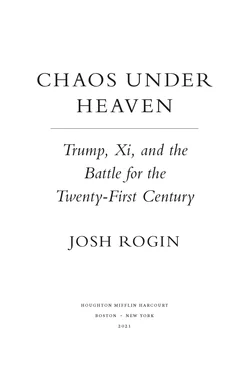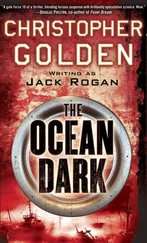Schwarzman had given over $100 million to a program to bring American students to study at Tsinghua University (Xi’s alma mater) and liked to brag that people called him “an unofficial ambassador” to China. Schwarzman’s business dealings in China gave him access to the very top. He had been close to Anbang Insurance Group chief Wu Xiaohui—the same executive whom Jared Kushner had met during the transition—before Wu was purged and jailed. (Blackstone sold $558 million worth of real estate to Anbang one month before the 2016 election.) Schwarzman also was close to HNA Group chairman Chen Feng; Blackstone did a ton of business with HNA, a mysterious but massive Chinese company with a murky ownership structure but clear political ties to the top of the Chinese Communist Party (CCP). For example, Blackstone sold HNA 25 percent of Hilton, also one month before the election, for $6.5 billion.
On top of all that, Schwarzman was good friends with Mnuchin. They had apartments together in the same New York building and would sometimes vacation together. They became close allies during the trade war, working together to persuade Trump to side with them against the hawks and working the Beijing side at the same time. Schwarzman describes his efforts to fight against trade tariffs on China and work toward a deal behind the scenes in his own book, What It Takes: Lessons in the Pursuit of Excellence. He claims he made several trips to China in 2018 to tell China’s top officials that Trump “was not looking for a trade war.”
But the North Korea issue was, in a sense, more urgent than the trade issue, and Trump needed Xi’s help. That’s what was on Tillerson’s mind at Mar-a-Lago. He met Xi at the airport and told reporters that the Trump administration would work with China to “find ways to exercise influence on North Korea’s actions to dismantle their nuclear weapons and their missile technology program.” The secretary of state was focused on getting the thing Trump wanted perhaps as much as a trade deal, or maybe even more: a peace deal with North Korea. “China can be part of a new strategy to end North Korea’s reckless behavior and ensure security, stability, and economic prosperity in Northeast Asia,” Tillerson said.
Trump was holding to his tough rhetoric on trade before the summit started. “We have been treated unfairly and have made terrible trade deals with China for many, many years,” he said before the summit started. “That’s one of the things we are going to be talking about.”
Some of Trump’s advisers worried that their boss may have wanted a trade deal too badly. Matt Pottinger and Kenneth Juster, the senior director of international economic affairs at the National Security Council, prepared a memo for Trump ahead of the summit to warn him not to fall into the traps Xi was likely to set. Don’t agree to grand bargains. Don’t agree to strategic dialogues. Don’t agree to get roped into a long personal entanglement with Xi, disguised as a friendship, that was aimed at neutering Trump’s instinct to toughen the US stance vis-à-vis China.
If Trump read the memo, he hid it well. Because, among other things, the Mar-a-Lago summit marked the beginning of his long flirtation with Xi.
The Art of the Steal
On April 7, Donald and Melania Trump were all smiles as they descended the red carpet to greet the Chinese president and his wife when they exited their limousine at the Mar-a-Lago entrance. Trump nodded enthusiastically, but didn’t bow, as he shook hands with Xi and Peng Li-yuan, a famous Chinese contemporary folk singer, and thanked them for coming. As they posed for a photo at the top of the entrance’s staircase, the reporters below stumbled over each other, fighting for the best shot. Trump pointed it out to Xi and made a crack that only Xi could hear. Xi nodded and smiled. He didn’t have a strong command of English. Trump didn’t seem to realize that.
Their first official meeting, which was supposed to last only thirty minutes, ended up stretching on for over two and half hours. Xi went through a litany of historical grievances, telling Trump about one hundred years of China’s humiliation and his family’s suffering during the civil war. Xi threw in a good deal of flattery for Trump, just for good measure. It worked.
“We’ve had a long discussion already. And so far, I have gotten nothing, absolutely nothing,” Trump said at the dinner table that first night. “But we have developed a friendship. I can see that. And I think long term we are going to have a very, very great relationship.”
Toward the end of that dinner, Trump leaned over and—while Xi was enjoying what Trump later called “the most beautiful piece of chocolate cake that you’ve ever seen”—the American president told Xi that the United States had fired fifty-nine missiles at Syria’s Assad regime, something even the American public didn’t yet know. China was not a party to the Syria conflict, but Trump’s attack certainly ran counter to China’s stance that authoritarian governments should be able to kill their own people, especially those who resist the regime. Was this meant to show Xi that Trump was willing to use force to solve probtems and punish rogue regimes? Not really. Trump was just bragging, about the missile strikes and the cake.
Trump later told the Wall Street Journal he had told Xi he was willing to be more lenient on trade if Xi cooperated more on pressuring North Korea. “But you want to make a great deal? Solve the problem in North Korea,” he said, describing his own logic. “That’s worth having deficits. And that’s worth having not as good a trade deal as I would normally be able to make.”
That linkage was seen by the hawks as not only a betrayal of the campaign’s promises, but a foolhardy one at that. By backing down on trade now, in exchange for promises of help on North Korea later, Trump was falling into an old trap. Xi was basically saying, “I will gladly pay you Tuesday for a hamburger today.” By actually suggesting this linkage, Trump was enthusiastically walking into one of the traps his advisers had warned against. Trump was also signaling to Xi that he could use the North Korea issue to squeeze concessions out of Trump, which he did over and over again. Trump actually gave Xi incentive to never help solve the North Korea problem.
Trump may have walked away from their meeting with “nothing, absolutely nothing,” but Xi won a lot of concessions at Mar-a-Lago. The threat of tariffs was tabled. The United States and China agreed to begin trade talks that would last the next one hundred days, with the goal of boosting US exports and thereby shrinking the trade deficit. Steven Mnuchin and Wilbur Ross would lead the negotiations. Trump also agreed not to name China a currency manipulator, breaking a campaign promise. And he entered into a “Comprehensive Economic Dialogue” with Beijing—a large and protracted set of meetings that would be the forum to discuss all the outstanding economic issues in the relationship. This was what the George W. Bush and Obama teams had done. Their meetings, which under Barack Obama had been called the “Strategic and Economic Dialogue,” became what in Washington is called a self-licking ice cream cone: a system whose sole purpose is to perpetuate its own existence. This was also another thing Steve Bannon, Peter Navarro, and even Pottinger had warned against. The new Comprehensive Economic Dialogue was to be a mini version of the old Strategic and Economic Dialogue. Xi couldn’t have asked for more.
Trump’s family members, as usual, could not resist getting involved. Ivanka tweeted out a video of two of her children, Arabella and Joseph, regaling Xi and his wife with a Chinese folk song called “Jasmine Flower.” How they had learned the Mandarin lyrics so well, most observers at the time could only guess.
Читать дальше











